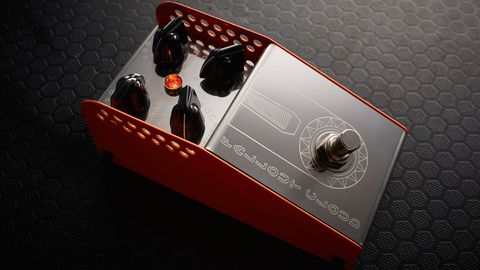Fallout is an unintentionally apt moniker for a pedal that draws so much tonal inspiration from a famous family of New York sustainer-fuzz pedals that it has recently been renamed to avoid being rammed amidships legally.
But while the Fallout Cloud may pay homage, it's very much a step apart from established classics, too. Indeed, that's its whole point.
Like its siblings, the Gunshot and Warthog overdrives, it's a four-knob pedal that's seated very robustly in a laser-etched stainless steel enclosure with side guards protecting your current knob settings from accidental re-alignment in your gigbag or on stage.
The controls govern volume, bass, treble and sustain. And there you have the nut of it: a common gripe levelled at pedals that live in the grimy hinterland between fuzz and distortion - such as the rightly celebrated 'triangle' Big Muff - is that the grungy, bass-rich compression associated with them gets a bit messy and muddy when you're trying to articulate chords.
So, the first way that ThorpyFX has tried to address that issue is to grant greater control over EQ: in other words, how much grinding edge and treble-detail you want to add and, conversely, how much you want to inflate the fat cushion of bass it surfs on. Secondly, the quality of the components is audiophile-grade, which itself grants some harmonic detail and clarity, especially at the more extreme settings.
Sounds
Plugged into a Dr Z Jaz 20/40, the Fallout Cloud immediately yields a familiar fat-but-cutting fuzz/ distortion. However, that classic cutting edge of sawblade mids and fried treble is more structured and overdrive-like here, especially with sustain low - though the outrageous bass push and empowering compression you'd expect is still available in spades.
Overall, it's a touch more 'hi-fi' and detailed at hotter settings than the gloriously sleazy greaseball of mid-grind served up by our comparison pedal, a 70s Big Muff Pi. It is also easier to fine-tune it to balance well with different amps and pickups, thanks to the EQ options, especially with thicker-voiced humbuckers.
The Fallout may be standing on the shoulders of a giant, but it's no clone - and you may even find yourself preferring the more spattery, chaotic grind of some vintage Muff variants. By contrast the Fallout is a stable, adaptable, impeccable sonic tool.


